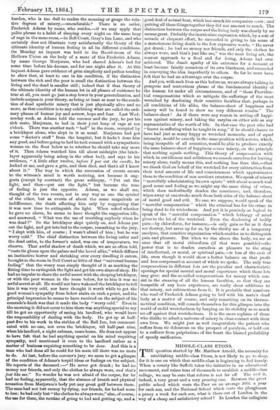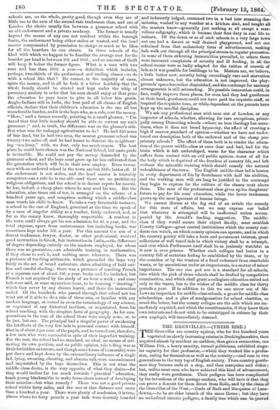MIDDLE-CLASS ETONS.
THE question started by Mr. Matthew Arnold, the necessity for establishing middle-class Etons, is not likely to go to sleep, for it is one on which that middle-class is beginning to feel keenly. When a county like Suffolk takes the initiative in an educational movement, and raises tens of thousands to establish a middle-class college, we may be sure that reform is not far off. The evil is, indeed, a very great and a very pressing one. Between the great public school which costa the Peer on an average 2001. a year for each son, and the National School which costa the ploughman a penny a week for each son, what is there out of London in the way of a cheap and satisfactory school? In London the collegiate schools are, on the whole, pretty good, though even they are of little use to the men of the second-rate tradesman class, and out of London the choice usually lies between a grammar school with an old endowment and a private academy. The former is usually beyond the means of any one not resident within the borough limits, the endowment being either stolen or wasted, and the head master compensated by permission to charge as much as he likes for all the boarders he can obtain. In three schools of the kind with which we happen to be familiar the average cost for the boarder per head is between 901. and 1001., and no amount of thrift will keep it below the former figure. What is a man with two sons and less than 5001. a year—a definition which includes, perhaps, two-thirds of the professional and trading classes—to do with a school like that ? He cannot, in the majority of cases, spare the money, and in all he feels it a bitter hardship that the whole family should be stinted and kept under the whip of pecuniary anxiety in order that his sons should enjoy at that price the education he pays taxes to give to all below him gratis. Anglo-Indians still in India, the best paid of all classes of English officials, declare that their children's education is the one all but unendurable burden, and it is the boys who, as a rule, cost the money. "Here," said a farmer recently, pointing to a small gleaner, "I'm taxed that that little monkey should be able to correct my son's grammar ;" and, in truth, the difference was on the gleaner's side. But what was the unhappy agriculturist to do? He had 250 acres of fair land, but he had two sons, the nearest grammar school was twenty-two miles off, and he had learnt to distrust the neighbour- ing "academy," with, we fear, only too much reason. The best place he could have chosen was the National School, but caste pride is invincible. He could not pay the money demanded by the grammar school, and the boys must grow up far less cultivated than the generation which will be in their own employ. Even towns- men with an endowed school in the town are but little better off. If the endowment is not stolen, and the head master is tolerably competent—as a rule he is too old—and there are no prohibitory religious obligations, and the school is in decent repute for morals, he has, indeed, a cheap place where he may send his son. But the education, nine times out of ten, is arranged on the scheme of a hundred years ago, and comprises nothing which a middle-class man wants his child to know. To take a very favourable instance, a school in the east of England, governed at the time we speak of by a man of singular ability as a teacher, fairly endowed, and, as far as the county knew, thoroughly respectable. A resident in the town could always get his son admission for 81. a year, and the total expense, apart from maintenance but including books, was sometimes kept under 301. a year. For this amount the son of a decent tradesman, lawyer, doctor, or other professional, received good instruction in Greek, fair instruction in Latin,—the difference of degree depending entirely on the masters employed, for whom there was no guarantee,—an admirable training in mathematics, if they chose to seek it, and nothing more whatever. There was a pretence of teaching arithmetic, which grounded the boys very fairly in the art of broad caricature, slates admitting of bold out- line and careful shading ; there was a pretence of teaching French at a separate cost of about 101. a year, books and fee included, but French is not acquired by the study of an hour a week ; and some lads were said, at some mysterious hour, to be learning " drawing," which they never by any chance learnt, and there the instruction ended. Of the hundreds who passed through that school not ten went out of it able to do a role of three sum, or familiar with any modern language, or versed in even the terminology of any science, or cognizant of any historical incident, or acquainted, from his school teaching, with the simplest facts of geography. As for com- pensations in the tone of the school there were simply none, or, to be just, but one. Tho principal had a singular power of awakening the intellects of the very few lads in personal contact with himself, that is, of about 3 per cent. of the pupils, and he turned out, therefore, a few men who were successful in spite of their imperfect training. For the rest, the school had no standard, no ideal, no means of esti- mating its own position, and no public opinion, tale-telling was as little forbidden as torture, and though some forms of immorality were put down and kept down by the extraordinary influence of a single lad, lying, swearing, cheating, and obscene talk were uncondemned and unpunished by the boys themselves. This is not what the middle class desire, is the very opposite of what they desire—for they would incline far too much towards " practical " education, teach young blacksmiths to make horse-shoes instead of developing their muscles—but- what remedy ? There was not a good private school within forty miles, and the one at that distance cost more than a hundred a year. There were plenty of academies, it is true, places where for forty pounds a year lads were decently boarded
and indecently lodged, crammed two in a bed into steaming dor- mitories, washed in any weather at a kitchen sink, and taught all the masters knew—generally just nothing at all except a mar- vellous caligraphy, which it became their first duty in real life to unlearn. Of the dozen or so of such schools in a very large town not one had a decent or well drained playground, and not one refrained from that melancholy form of advertisement, making lads walk out through all the principal streets in regular procession. In some of them sickening immoralities prevailed, in others there were incessant complaints of severity and ill feeding, in all the school-rooms were as badly adapted for the tuition of crowds of lads as it was possible for buildings to be. Matters are, we believe, a little better now, severity being exceedingly rare and starvation almost unknown, but the education is not improved, the play- grounds' space has rather diminished, and the contempt for sanitary arrangements is still astounding. No possible innovation could, in fact, really improve these places, for even had they had gentlemen at their head, gentlemen could not have paid the requisite staff, or inspired the requisite tone, or while dependent on the parents have kept up the needful discipline.
We ask any professional man with sons out of London, or any inspector of schools, whether, allowing for rare exceptions, princi- pally among Dissenting schools —where an iron theology has some- times, when it does not breed hypocrisy, the effect of creating a high if narrow,standard of opinion—whether we have not under- toned our description both of the endowed and of the cheap pro- prietary schools ? The effect of them both is to render the educa- tion of the poorer middle-class at once dear and bad, bad for the brain which is left undeveloped, worse for the character which suffers from contact with an evil public opinion, worst of all for the body which is deprived of the freedom of country life, and left without the scientific training which should remedy the natural unhealthiness of the town. The English middle-class lad is beaten in every department of life by Scotchmen with half his abilities, and the working men will ere long be justified in the contempt they begin to express for the culture of the classes next above them. The man of the professional class gives up his daughters' future to pay for his sons' education, while the lower tradesman grows up the most ignorant of human beings.
We cannot discuss at the fag end of an article the remedy for this state of affairs, but we may express our belief that whatever is attempted will be ineffectual unless accom- panied by Mr. Arnold's leading suggestion. The middle- class if they would secure their object finally, must establish County Colleges—great central institutions which the county resi- dents can watch, on which county opinion can operate, and in which the country gentry will take a keen and permanent interest, great collections of well toned lads in which victory shall be a triumph, and over which Parliament itself shall be as jealously watchful as it now is over prisons. Whether such colleges had better in a country full of sectarian feeling be established by the State, or by the counties, or by the trustees of a fund redeemed from charitable waste, or by associations under an inspectorate, is a matter of minor importance. The one sine quit non is a standard for all schools, into which the pick of those schools shall be drafted by competitive examination, and which shall grant a collegiate education suited not only to the wants, but to the wishes of the middle class for thirty pounds a year. If in addition to this we can screw out of Mr. Lowe an inspection for middle-class schools, a grant for middle class scholarships, and a plan of amalgamation for school charities, so much the better, but the county colleges are the aids which are im- mediately required, and which the constituencies, if they know their own interests and do not wish to be outstripped in culture by their own employes, will immediately demand.































 Previous page
Previous page